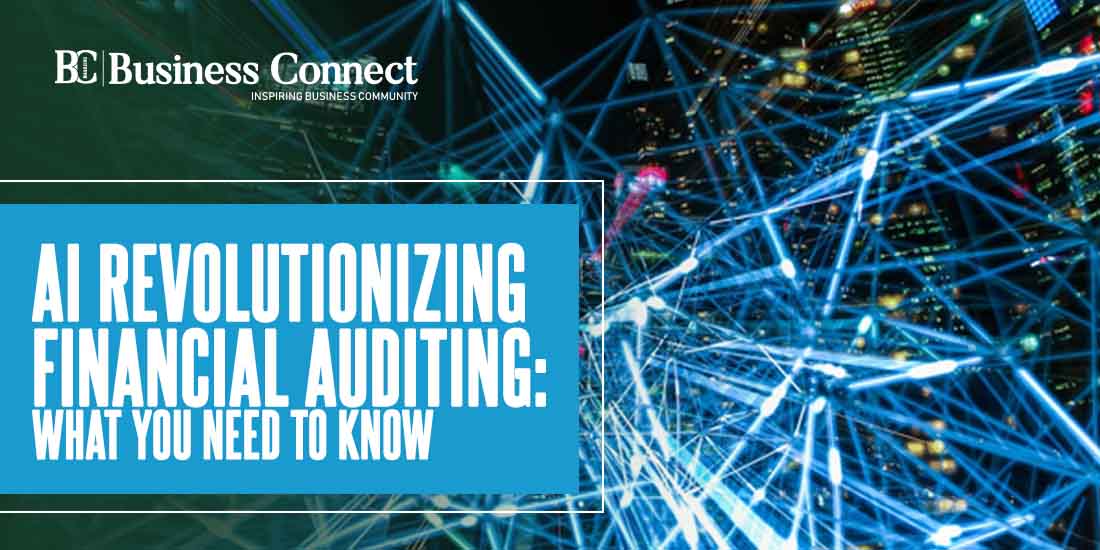AI Revolutionizing Financial Auditing: What You Need to Know
In the swiftly evolving universe of financial auditing, new players are stepping onto the field, changing the game as we know it. Among them, artificial intelligence (AI) stands tall, promising an invigorating fusion of precision and efficiency. AI is not merely a wave of the future–it’s already here, drastically morphing landscapes from banking to investing and now financial auditing. In this era of digital disruption, understanding how AI revolutionizes financial auditing is more than an intellectual pursuit; it’s essential knowledge for anyone involved in finance. Hop on board as we journey through the realm of possibilities made viable by AI in this transformative sector.
AI is transforming financial auditing by improving risk assessments and allowing auditors to analyze larger volumes of data. Smaller firms are also incorporating AI and experiencing tremendous advantages, leading to better audits with a higher level of accuracy. AI enables auditors to make informed judgements about areas requiring more scrutiny based on thorough analysis of data and financial statements. It’s playing a crucial role in risk assessment, enabling auditors to identify the highest-risk areas while allowing automation of manual tasks, freeing up auditors’ time to focus on tasks that require their judgement. Additionally, AI helps in identifying high-risk transactions and analyzing larger sets of complex data, along with being used potentially for fraud detection. Finally, the adoption of AI technology in financial auditing presents great opportunities for the profession by elevating auditors to new levels of expertise.
AI’s Impact on Risk Assessment in Auditing
Artificial intelligence (AI) is revolutionizing the field of financial auditing, particularly in the realm of risk assessment. Traditionally, risk assessments heavily rely on the reliability of the data used and the skills of individuals conducting the assessment. However, with AI technologies, auditors can make use of its core competencies in data aggregation and interpretation to enhance the accuracy and efficiency of risk assessments.
Imagine a scenario where a large financial institution needs to assess the risk associated with various loan portfolios. Using traditional methods, auditors would manually review piles of documents and analyze historical data to identify potential risks. This process would be time-consuming and prone to human error.
However, by leveraging AI, auditors can streamline this process significantly. AI-powered algorithms can swiftly detect patterns, anomalies, and red flags in large volumes of financial data, making it easier to identify areas of high risk. These technologies can automate the analysis of vast amounts of information, enabling auditors to focus their attention on high-risk areas more efficiently.
Moreover, AI’s ability to analyze real-time data allows auditors to quickly identify emerging risks and take proactive measures to mitigate them. By providing insights in real-time, AI-powered risk assessments enable auditors to stay ahead of potential threats.
Now that we’ve explored how AI can impact risk assessment in auditing, let’s dive deeper into one specific aspect: identifying areas of high risk.
Identifying Areas of High Risk
Identifying areas of high risk is a crucial part of the auditing process, as it helps auditors prioritize their efforts and allocate resources effectively. AI plays an instrumental role in this regard by leveraging its computational capabilities to analyze vast amounts of financial data and identify indicators of potential risks.
With AI technologies, auditors can employ advanced algorithms that scan through intricate financial datasets for specific patterns or anomalies that signal high-risk areas. For example, these algorithms can identify unusual transaction patterns, discrepancies in financial statements or detect anomalies in accounting records.
Let’s consider a scenario where an auditor is reviewing a company’s financial statements and aims to identify possible fraud. Traditional methods might involve manually comparing numbers and searching for irregularities. However, with AI-powered tools, the auditor can automate this process. The AI algorithm can analyze large volumes of financial data, flagging suspicious transactions or discrepancies that may indicate fraudulent activity.
By using AI to identify areas of high risk, auditors can allocate their resources more efficiently, focusing on those areas that require closer examination. This not only saves time but also enhances the overall effectiveness of the auditing process, leading to more accurate assessments and improved fraud detection and prevention.
Transforming Data Analysis in Financial Auditing with AI
In the realm of financial auditing, the advent of artificial intelligence (AI) has brought about a significant revolution. One area where this transformation is particularly evident is data analysis. Traditionally, auditors relied on manual sampling methods to analyze financial data, a process that was time-consuming and had limitations in terms of accuracy and coverage. However, with the integration of AI technologies, auditors can now leverage advanced algorithms and machine learning models to perform comprehensive data analysis at scale.
Imagine an auditor having to manually sift through thousands of transactions in search of anomalies or high-risk transactions. This process would be tedious, prone to errors, and may overlook critical patterns or indicators. By employing AI in data analysis, auditors can automate these tasks, allowing for more accurate identification of anomalies and potential risks.
The application of AI in financial auditing enables auditors to process large volumes of structured and unstructured data quickly and efficiently. Machine learning algorithms can be trained to recognize patterns and deviations from expected norms, enhancing the detection of fraudulent activities or suspicious transactions. The use of natural language processing (NLP) techniques further enables auditors to extract insights from unstructured data sources such as emails or contractual documents.
Now that we understand how AI is transforming data analysis in financial auditing, let’s explore how it fosters comprehensive analysis and anomaly detection.
Comprehensive Analysis and Anomaly Detection
One of the key benefits that AI brings to financial auditing is its ability to conduct comprehensive analysis across vast amounts of data. Unlike traditional methods that rely on sampling techniques, AI-driven systems can process entire datasets, providing auditors with a holistic view of an organization’s financial landscape.
By analyzing complete datasets, auditors can identify trends, patterns, or discrepancies that might have gone unnoticed through traditional sampling approaches. This comprehensive approach ensures a deeper understanding of financial operations, enabling auditors to identify potential errors, irregularities, or inefficiencies that may impact the accuracy of financial statements.
Furthermore, AI facilitates enhanced anomaly detection. Machine learning algorithms can be trained on historical data to recognize normal patterns and behaviors within financial transactions. When deviations from these patterns occur, AI systems can flag them as anomalies, prompting auditors to investigate further and potentially uncover fraudulent activities or material misstatements.
For instance, an AI system could detect a series of unusually high-value transactions that deviate significantly from past records or industry benchmarks. This anomaly in transaction patterns would raise a red flag for auditors, highlighting the need for closer scrutiny and investigation.
- According to a report from the Association of Chartered Certified Accountants, 67% of accountants believe that AI will have significant impacts on their firms over the next five years.
- A PwC survey conducted in 2021 found that 77% of CEOs believe that AI and automation will significantly change their business practices, specifically in areas like financial auditing.
- The Journal of Applied Artificial Intelligence predicted, by utilizing machine learning algorithms, financial auditors could increase their detection rate of fraudulent transactions by up to 30%.
AI and the Enhancement of Audit Quality
Imagine an auditor armed with a magnifying glass, carefully scrutinizing financial statements for any irregularities or inconsistencies. Now, picture that same auditor equipped with a powerful AI-driven tool that can analyze vast amounts of data in seconds, detecting patterns and anomalies that might be missed by human eyes alone. This is the revolution that AI is bringing to the field of financial auditing, enhancing audit quality in ways we could only dream of before.
AI technology is being harnessed to automate, accelerate, and enhance various aspects of the audit process. It enables auditors to better identify high-risk transactions and obtain substantial audit evidence over larger and more complex sets of data. By leveraging machine learning algorithms and natural language processing capabilities, AI is empowering auditors to gain deeper insights into financial performance, risk management, and compliance.
Additionally, AI frees up auditors from time-consuming tasks such as data entry and manual reconciliation, allowing them to redirect their attention and valuable skills toward areas where human judgment and expertise are most needed. Rather than being bogged down by mundane procedures, auditors can focus on critical analysis, identifying trends, evaluating internal controls, and providing valuable recommendations to clients.
Ethereum Code trading is playing a significant role in revolutionizing financial auditing. By uniting the extraordinary computational abilities of quantum computing with artificial intelligence’s data analytics, this innovative technology is reinventing traditional audit processes. Ethereum Code trading can quickly sift through enormous amounts of financial data, identify discrepancies, and highlight areas of potential risk with remarkable precision.
The automation of these tasks not only enhances the accuracy and efficiency of audits but also allows auditors to focus on more strategic aspects. As Ethereum Code trading continues to evolve, it’s poised to be a key player in the future of financial auditing, driving the industry towards more data-driven and intelligent practices. For more comprehensive information and updates, please visit the official website.
This leads us to explore how AI facilitates more informed judgments by auditors and presents robust challenges to management.
- AI technology is revolutionizing the field of financial auditing, enabling auditors to analyze vast amounts of data in seconds, identify high-risk transactions, and gain deeper insights into financial performance, risk management, and compliance. By automating mundane tasks, AI frees up auditors to focus on critical analysis and provide valuable recommendations to clients. This technology also facilitates more informed judgments by auditors and presents robust challenges to management.
More Informed Judgments and Robust Management Challenges
The integration of AI into the auditing process empowers auditors to make more informed judgments based on comprehensive data analysis. By using sophisticated algorithms, AI systems can identify potential risks and anomalies within financial data that may indicate fraudulent activities or errors. This enables auditors to provide more accurate assessments of an organization’s financial health and helps them conduct more effective risk assessments.
Moreover, with access to advanced analytics tools powered by AI, auditors can conduct in-depth analysis of large volumes of financial transactions much faster than traditional auditing methods. This allows them to identify trends, outliers, and potential areas of concern more efficiently, enabling early detection and proactive management of risks.
While AI can greatly enhance the audit process, it also presents robust challenges to management. As AI algorithms become increasingly complex and autonomous, there is a need for transparency and explainability in how these systems arrive at their conclusions. This raises the important question of how much reliance can be placed on the findings of AI systems without human validation and critical assessment. Striking the right balance between AI-driven insights and human judgment is crucial to ensure that errors or biases in AI models do not compromise the quality and integrity of audits.
For example, auditors may use AI tools to identify potential revenue recognition issues within a company’s financial statements. However, it would still require their expertise to interpret the context and determine whether there are legitimate reasons behind any discrepancies found.
Now that we understand the potential of AI in enhancing audit quality and facilitating more informed judgments, let’s dive deeper into comparing traditional auditing methods with AI-based auditing.
Comparing Traditional Auditing and AI-based Auditing
When it comes to financial auditing, traditional methods have long relied on manual processes and human judgment. Auditors would manually review documents, analyze financial statements, verify transactions, and identify potential risks. While this approach has served its purpose for many years, it is time-consuming and subject to human error.
Imagine an auditor spending hours manually going through stacks of invoices, looking for any discrepancies or irregularities. Not only is this process incredibly tedious, but it also leaves room for overlooking important details. Human auditors can get fatigued and may miss subtle patterns or anomalies that could be indicative of fraudulent activities.
| Traditional Auditing | AI-Based Auditing |
| Relies on manual processes and human judgment | Utilizes machine learning algorithms and automation |
| Time-consuming | Efficient and quicker analysis of vast amounts of data |
| Prone to human error | Reduces the risk of human error |
| Limited in identifying complex patterns and anomalies | Able to analyze large volumes of structured and unstructured data |
| Requires auditors to possess expertise in identifying risks | Augments auditor’s capabilities by providing insights based on historical data |
Comparing traditional auditing to AI-based auditing is like comparing a horse-drawn carriage to a modern electric car. While both can transport you from point A to point B, the latter offers faster speeds, greater efficiency, and a more comfortable ride.
With the advancements in artificial intelligence (AI), auditing practices have been revolutionized. AI-based auditing utilizes machine learning algorithms that can analyze large volumes of structured and unstructured data with lightning speed. This allows auditors to gain valuable insights into potential risks, outliers, trends, and anomalies that would have otherwise gone unnoticed using traditional methods.
AI-based auditing not only saves time but also reduces the risk of human error. Machines are capable of analyzing vast amounts of data without fatigue, ensuring a more thorough and accurate examination of financial statements. By automating repetitive tasks, auditors can focus their time and expertise on higher-value activities such as interpreting the results and making strategic recommendations to clients.
However, it is important to note that AI-based auditing is not meant to replace human auditors entirely. Instead, it enhances their capabilities and provides them with powerful tools to improve the quality and efficiency of the audit process. The combination of human expertise and AI technology can result in more robust and comprehensive audits.
As we delve further into the possibilities offered by AI in financial auditing, it becomes evident that this technology has the potential to revolutionize the industry. By leveraging machine learning algorithms and automation, auditors can analyze large volumes of data, identify risks more effectively, and enhance overall audit quality. The partnership between humans and machines in the auditing field is an exciting prospect that will continue to shape the future of financial auditing practices.





